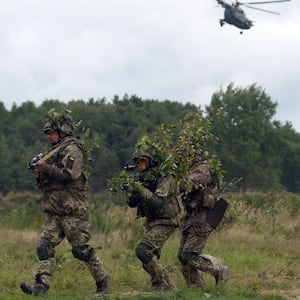The U.S. intelligence community believes Russia is preparing a so-called false flag operation against its own military so that Russia can justify an attack on Ukraine, a U.S. official told The Daily Beast Friday.
“Russia is laying the groundwork to have the option of fabricating a pretext for invasion, including through sabotage activities and information operations, by accusing Ukraine of preparing an imminent attack against Russian forces in eastern Ukraine,” a U.S. official told The Daily Beast. “Russia has already prepositioned a group of operatives to conduct a false flag operation in eastern Ukraine.”
In particular, the primary source of attacks is expected to come in eastern Ukraine, the official said.
The news comes just days after talks with Russia failed to lead to any diplomatic breakthroughs that would indicate Russia is backing off invading Ukraine, while hundreds of thousands of Russian troops remain positioned along Ukraine’s borders, prepared for attack. So instead of announcing a diplomatic deal, the U.S. government is taking to exposing Russia’s latest antics in an attempt to blunt them.
The U.S. has also been monitoring Russian efforts to spread disinformation that would help justify a potential military incursion into Ukraine, the U.S. official said.
“Our information also indicates that Russian influence actors are already starting to fabricate Ukrainian provocations in state and social media to justify a Russian intervention and sow divisions in Ukraine,” the official said.
Narratives Russian actors have zeroed in on have included content about a poor state of human rights in Ukraine and militancy of Ukrainian leaders, the official said.
It’s all part of a grand scheme Russia has been relying on for months now. It has been hinting at Ukrainian aggression and failings in order to create a pretext for invasion, researchers at the Atlantic Council’s Digital and Forensic Research Lab (DFRLab) told The Daily Beast.
Some of the Russian operations look poised to justify actions or deny involvement later, said Graham Brookie, the DFRLab’s senior director.
“I would characterize what we’re seeing from Russia is a more aggressive deployment and expansion of existing narratives that includes the consistent anti-NATO [content] and consistent deflections, such as [saying], ‘this isn’t our fault… we only have so far to retreat,’” Brookie told The Daily Beast, suggesting Russian influencers are laying pretext for invasion. “In this scenario you’re not going to change public opinion in short order… but you can position to deflect your actions or be able to deny your actions or justify your actions via information operations.”
“These media narratives also blame the West for escalating tension, highlight humanitarian issues in Ukraine that Russian intervention could solve, and promote Russian patriotism to encourage domestic support for military action,” the U.S. official added.
The official added that Russia is prepared to conduct its sabotage activities either this month or by mid-February, weeks before an invasion.
“The Russian military plans to begin these activities several weeks before a military invasion, which could begin between mid-January and mid-February,” the U.S. official told The Daily Beast. “We saw this playbook in 2014 with Crimea.”
In the limited window before then, Ukraine is still hoping a diplomatic effort might ease tensions. Ukraine has been working to organize a trilateral meeting between President Joe Biden, Ukrainian President Volodymyr Zelenskiy, Russian President Vladimir Putin, and Andriy Yermak, the head of the Ukrainian president’s office, said Friday during an Atlantic Council virtual call. Yermak said they are just waiting for a reaction from the Russian side.
There have been indications in recent days, though, that Russian forces are already ramping up and preparing for an increased pace of military activity, Michael Sheldon, a DFRLab research assistant, told The Daily Beast.
”I think the primary outlier is… the fact that they’re dipping into units from the eastern military district is the escalation,” Sheldon said. “Beyond that we’re seeing movement of Iskander short-range ballistic missiles from… at least two separate missile brigades.”
Russian armed forces have been bolstering their training and preparations in recent days, including in “tactical, engineering, and fire training, including fire trainings for tank, battle vehicle, and artillery and mortar crews,” Ukraine’s Ministry of Defense said Friday. On Friday Russian forces have also violated the ceasefire, as they have many times before, Ukraine’s Ministry of Defense said Friday.
Tensions are mounting in other arenas as well. An unknown actor or set of hackers attacked Ukrainian government websites, from the Ministries of Foreign Affairs and Defense to Ministry of Education sites. It was unclear who was behind the defacement, but when tensions have escalated in the past, similar defacements have occurred, experts said.
“All data on your computer is being erased and won’t be recoverable. All information about you has become public, fear & expect the worst,” the message on the defaced foreign ministry site said.
"It’s too early to draw conclusions as the investigation is ongoing, but there is a long record of Russian cyber assaults against Ukraine in the past,” a Ukrainian Ministry of Foreign Affairs spokesperson said.








